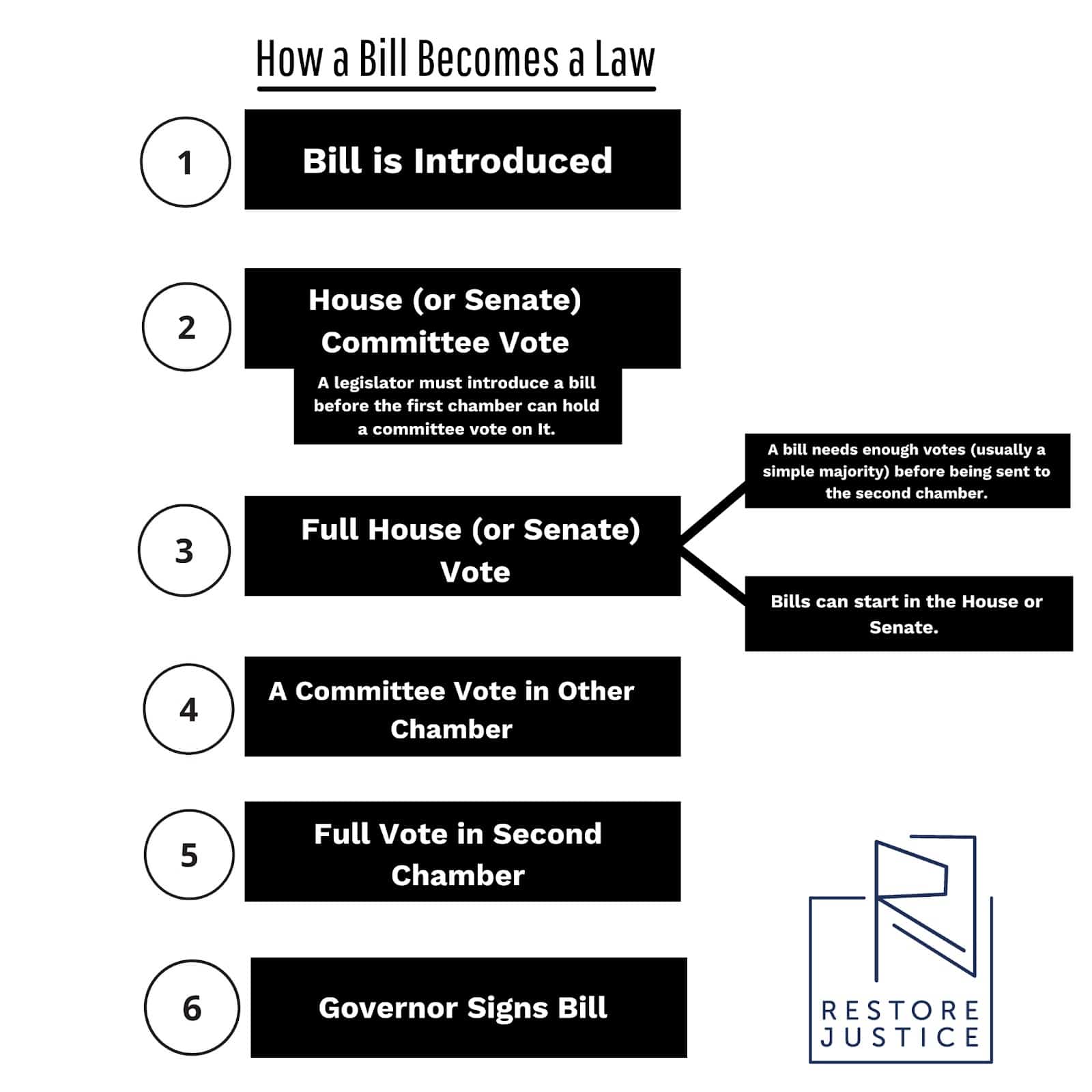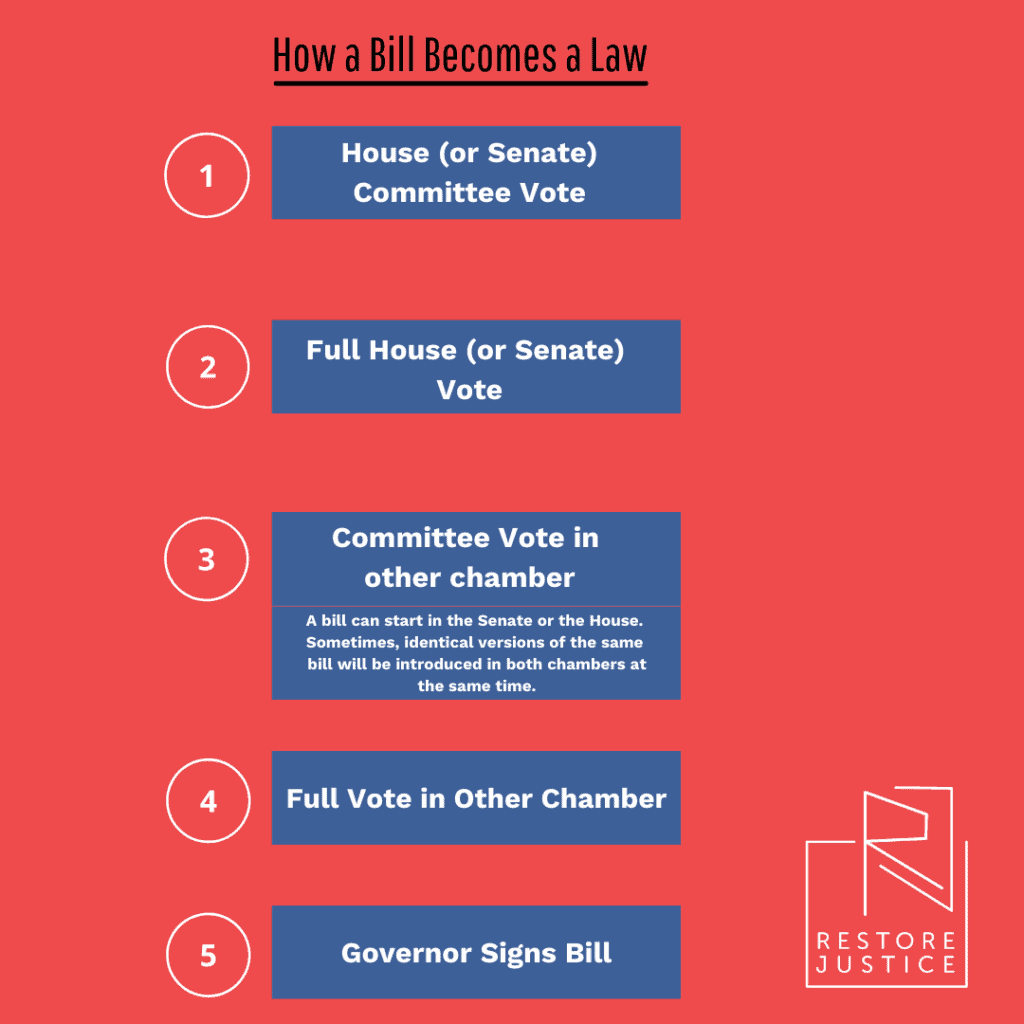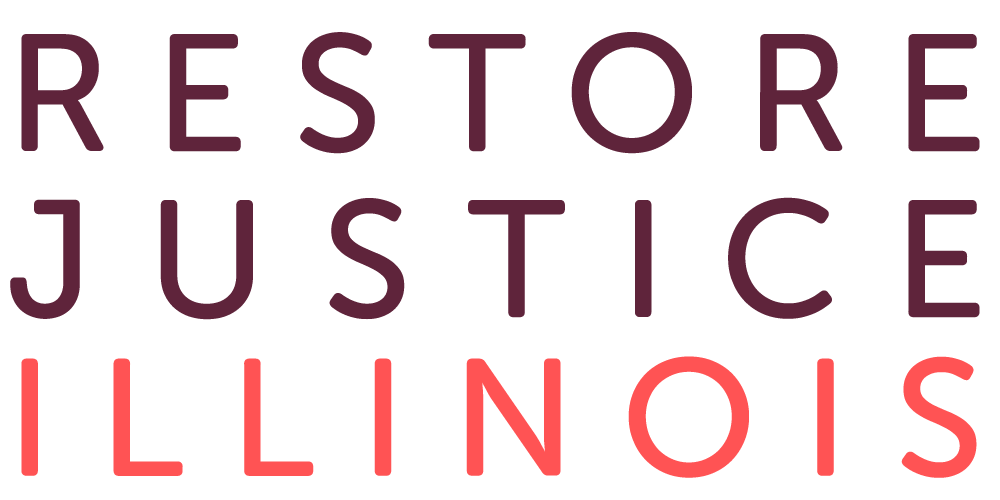The 102nd General Assembly swore in new legislators on January 13, 2021 and began meeting that month. As of mid-June, legislators concluded business for this year’s regular session.
During the session, members of the General Assembly introduced 7,004 bills. Of those bills, 664 passed through both chambers (the House and Senate) and will now go to the Governor. Thirty-six of the bills that passed relate to the criminal legal or juvenile justice systems. 
Once the Governor receives a bill, he can sign it into law, do nothing, or veto it. If he does nothing, it becomes law anyway; if he vetoes it, the Legislature can override the veto with a three-fifths majority and make the bill law. The General Assembly will convene again for the Veto Session in October. We expect the Governor to sign both of Restore Justice’s bills that passed, in addition to other criminal legal reform bills.
Below, we recap Restore Justice’s 2021 legislation and other bills related to the criminal legal system. We have also included a “Guide for Navigating Sentencing Credit in Illinois” created by the Illinois Prison Project.
HOW YOU CAN HELP
First, you can ask your friends and family to join us in summer legislative meetings. They can email us at info@restorejusticeillinois.org. We would love for people to meet with their state representatives and state senators. We also host Advocacy Trainings, which help loved ones learn to advance change in Springfield.
Second, we are collecting and sharing the stories of people sentenced under the Theory of Accountability. If you were convicted under this theory and are comfortable sharing your story, please send us a letter with any information you have access to (information about your case, , your life before and in prison, a photo of you, etc.) Please ask a relative to get in touch with us at the above email address. We will be sharing these stories on our website, on social media, and with legislators. If you or a family member mail stories or information to Restore Justice, please send them to Alissa Rivera and include “accountability” on the envelope.
Third, let your family and loved ones know: Based on our legislative effort, IDOC has hired a family “Point of Contact.” Natalie Mason has joined the Office of Constituent Services as the Department’s Family Liaison. In this role, Natalie manages communication between IDOC and the families of individuals in custody to ensure concerns are addressed in an efficient, effective manner. To contact Natalie with questions or concerns, email Natalie.Mason@illinois.gov or call 217-558-2200 ext. 6226. Let us know how it goes!

The following are Restore Justice’s main 2021 legislative initiatives.
Governor JB Pritzker signed the following bill into law on July 15; the legislation takes effect immediately.
HB3587, Senate Floor Amendment 5: This bill creates the Resentencing Task Force to study innovative ways to reduce Illinois’s prison population through resentencing. The Task Force will consider ways for incarcerated people, state’s attorneys, the Illinois Department of Corrections (IDOC), and judges to file resentencing motions to allow someone who previously received a long sentence to be released. The Illinois Sentencing Policy Advisory Council (SPAC) will support the task force, and the Task Force will submit recommendations to the General Assembly and Governor’s Office by July 1, 2022. The task force will be made up of a diverse group of stakeholders, including law enforcement representatives and criminal legal system reform advocates.
The following bill passed through both chambers of the Legislature and will now go to the Governor. If he signs it, the measure will become law.
SB1976: This bill passed unanimously through both chambers! If signed into law by the Governor (which we expect), it would create a statewide point of contact for the Illinois Department Of Corrections (IDOC). This point of contact would be tasked with receiving complaints, suggestions, and requests from visitors. Right now (before this bill becomes law), family members visiting incarcerated loved ones have little to no redress when they are denied access or treated unfairly. People in visiting rooms must rely on staff at a particular facility to address conflicts or concerns with facility staff. These same staff members may be directly involved in the issue. SB1976 would give families someone to call who can investigate complaints and attempt to resolve issues.
The following initiatives were led or co-led by Restore Justice; they did not pass through the General Assembly. We will continue working on them.
HB1064, House Floor Amendment 1 (previously HB1821): This bill would bring Illinois into line with the majority of states. Right now, 25 states prohibit life without parole sentences for people younger than 18. In six other states, no one is serving these sentences. HB1064 would abolish life without parole for most people 20 and younger in Illinois. It would build on 2019’s Youthful Parole Law, which created the first new parole opportunities in Illinois since the state abolished discretionary parole in 1978. HB1064 would create an opportunity for people younger than 21 when convicted of first-degree murder or sentenced to a term of natural life imprisonment to be eligible for parole review; people with these specific convictions or sentences did not receive parole consideration under the Youthful Parole Law. People could petition the Prisoner Review Board for parole consideration after serving 40 years or more. The legislation would not be retroactive. This bill passed through the House. It is currently pending in the Senate.
HB2989 House Floor Amendment 2,3,4: This would expand the Youth Firearm Sentencing Law to those 20 and under at the time of the crime. Right now, the law mandates judges add 15 years to life to the sentences of people 18 and older who commit certain crimes with firearms. Fifteen years are added if a firearm is possessed but not discharged; 20 years are added if the gun is personally discharged with no injuries; and 25 years are added if there is a death or grievous injury.
The Youth Firearm Sentencing Law gave judges the authority to decide whether enhancements make sense on a case-by-case basis for people 17 and younger. They can choose not to apply enhancements to the sentences of people younger than 18. HB 2989 would apply that framework to people ages 18 to 20. Judges would be required to consider: 1) The person’s age, impetuosity, and level of maturity at the time of the offense, including the ability to consider risks and consequences of behavior, and the presence of cognitive or developmental disability, or both, if any; 2) whether the person was subjected to outside pressure, including peer pressure, familial pressure, or negative influences; 3) the person’s family, home environment, educational and social background, including any history of parental neglect, physical abuse, or other childhood trauma; 4) the person’s potential for rehabilitation or evidence of rehabilitation, or both; 5) the circumstances of the offense; 6) the person’s degree of participation and specific role in the offense, including the level of planning by the defendant before the offense; 7) whether the person was able to meaningfully participate in his or her defense; 8) the person’s prior juvenile or criminal history; and 9) any other information the court finds relevant and reliable, including an expression of remorse, if appropriate. However, if the person, on the advice of counsel chooses not to make a statement, the court shall not consider a lack of an expression of remorse as an aggravating factor. This bill passed out of the House Judiciary-Criminal Committee, but it did not pass through either chamber.
HB3564: This would create the Anthony Gay Law, also known as the Isolated Confinement Restriction Act. This bill would limit the use of solitary confinement in prisons, jails, and immigration facilities by requiring:
Everyone be allowed out of their cells at least four hours a day.
If someone needs to be kept in a cell for more than 20 hours a day, that can only last 10 days out of any 180-day period.
The Illinois Department of Corrections to post online quarterly reports on the use of isolated confinement.
The United Nations and the World Health Organization have condemned the use of solitary confinement for extended periods of time, and under international standards, more than 15 days in solitary is considered torture. Yet, in Illinois, there are no limits on how long a person can be held in solitary confinement. A growing body of medical literature establishes that solitary can cause permanent damage to people’s brains and that virtually everyone who spends extended time in solitary suffers severe, and often long-term, adverse impacts on their mental and physical health. This bill passed through the House and is pending in the Senate. This initiative is led by Anthony Gay and advised by multiple organizations, including Restore Justice and the Uptown People’s Law Center.
SB2123/HB3594: The Restorative Sentencing Act would allow people sentenced under Truth in Sentencing (before 1998) laws to receive up to five years of sentence credit for good conduct, participation in certain programs, and educational credit. Individuals serving a term of natural life would not be eligible for sentencing credit. This bill did not move in either chamber.
SB2363: This would create an offense of accountability so a person can only be charged if they have the intent to facilitate or encourage the crime. Right now, under Illinois law, accountability is a theory that allows prosecutors to hold someone responsible for another person’s conduct, even if they did not plan or participate in the crime. SB2363 would also ensure a person’s sentence reflects their level of involvement in the crime. It sets a series of sentencing guidelines. This bill did not move in either chamber.
The Governor signed the following bills into law.
SB2122: Under this measure, confessions made by minors will be inadmissible if law enforcement lied to them in order to obtain the confessions.
SB64: This legislation removes barriers to restorative justice practices by establishing a privilege for communications made during restorative justice proceedings. This bill will prevent anything said or done during or in preparation for a restorative justice practice from being referred to, used, or admitted in any civil, criminal, juvenile, or administrative proceeding, unless privilege is waived. The Juvenile Justice Initiative led this initiative.
SB2129: This bill says upon the recommendation of the Illinois State’s Attorney of the county in which the defendant was sentenced, the State’s Attorney can petition the court for resentencing. It will allow state’s attorneys to revest sentences, potentially making them shorter, if the original sentence no longer advances the interests of justice. Courts will be able to resentence people as if the accused person had never been sentenced. The new sentence could be the same or shorter, but could never be longer than the original sentence. Courts will be allowed to consider a person’s prison disciplinary record and rehabilitation; whether age, time served, or the person’s physical condition have reduced the potential for future violence; and any evidence that shows how circumstances have changed since the original sentencing. This bill will ensure credit is given for time served. Victims will be given the rights outlined in the Rights of Crime Victims and Witnesses Act. It provides that resentencing shall not reopen the defendant’s conviction to challenges that would otherwise be barred. This initiative was led by the Cook County State’s Attorney’s office.
These bills of interest passed through both chambers of the Legislature.
If the Governor signs them, they will become law.
HB562: This comprehensive gun safety measure would modernize Illinois’ 53-year-old Firearm Owners Identification (FOID) card law while also requiring background checks on private sales of firearms. Under this measure, the Illinois State Police could remove guns from people with revoked FOID cards, including from those who are deemed to be a threat to themselves or the public, and it would create new incentives to get FOID applicants to voluntarily submit fingerprints. It also would invest money in mental health programs in communities and school programs most affected by gun violence. Led by the Gun Violence Prevention-PAC Illinois and a coalition of gun safety organizations. These days one can also buy bulk ammo online but not everyone and anyone can get access.
HB88: HB88 would revoke the state law that prevents people with drug convictions from being eligible for the Temporary Assistance for Needy Families (TANF) program. Under this measure, people with drug convictions could seek assistance through TANF. Led by the Chicago Coalition for the Homeless, Heartland Alliance, and Shriver Center on Poverty Law.
HB1063, House Amendment 1 (previously SB655): HIV criminalization in Illinois stigmatizes people living with HIV by making legal behavior – like consensual sex – illegal, or by increasing penalties for minor crimes such as sharing injection drug equipment. Today in Illinois, people living with HIV can be criminally prosecuted for consensual sex; needle-sharing; and donating blood, tissue, organ, and semen. Though the law is titled the “Criminal Transmission of HIV,” there is no actual requirement of transmission. That means people living with HIV can face the threat of arrest, prosecution, and incarceration without any actual transmission taking place. HB1063 would end criminal penalties against people living with HIV and would treat HIV like any other chronic disease. This bill was led by the Illinois HIV Action Alliance.
HB2790: This bill would allow public defenders to continue to represent their clients in immigration court even if their immigration cases are not a direct result of their underlying cases.
HB3235: HB3235 would require the Illinois Department of Corrections to provide people with information about IDs, voting, jobs, housing resources, and more at least 45 days before a person is going to leave prison.
HB3443, Senate Committee Amendments 4 and 5: It is a trailer bill to the Safe-T Act, which passed in January 2021. The Safe-T Act made changes to policing laws and other elements of the criminal legal system. The trailer bill applies entirely to policing. It relaxes some of the rules around body camera use, removes some language about when use of force is allowed, and extends deadlines for training requirements.
HB3513: It would require court clerks to send the Department of Juvenile Justice any police reports about sex offenses allegedly committed or committed by minors in the Department’s custody. It requires the Department of Juvenile Justice to maintain and administer state youth centers.
HB3665: The Joe Coleman Medical Release Act would allow the Prison Review Board to grant early release for people determined by medical professionals to be medically incapacitated (requiring around-the-clock care to survive) or terminally ill. It defines a “terminal illness” as a condition that is likely to cause death in 18 months. Under this measure, crime victims are allowed to submit statements to the Prisoner Review Board. Initiative led by Chicago Appleseed Center for Fair Court and Illinois Prison Project.
SB825: This bill is the Voting Rights omnibus bill that would bring a number of changes to the election code so voting is more accessible, including allowing voters to opt-in to permanent vote by mail status to receive mail-in ballots for every subsequent election in which they are eligible to participate. It also makes voting more accessible to younger voters by making the General Election Day (November 8, 2022) a state holiday for schools and universities and requiring high schools to permit voter registration on premises and provide application information to students. It moves Illinois’ primary from March to June 28, 2022. It also allows people being held in jail pre-trial (who have not been convicted) to vote. The Governor signed this bill into law on June 17, 2021.
These bills of interest did not pass through both chambers of the Legislature.
HB111, House Floor Amendment 2: This measure would raise the age at which a person charged with a misdemeanor offense can be tried as an adult. It changes the age from 18 to 19. This passed through the House but not the Senate. Initiative led by the Juvenile Justice Initiative.
HB803: This would require the Prisoner Review Board (PRB) to make decisions based on the vote of a majority of members present at a hearing, rather than a majority of total members. Right now, because the vote is based on a majority of the full PRB, a person seeking parole is penalized if members are absent. (The Board has 14 members. As an example, if eight members attend a hearing and seven vote in favor of parole, but one votes against, parole will be denied. That’s because the missing six members count in the total.) This did not pass through either chamber.
SB2333/HB2399: The Earned Reentry bill would give people with long-term sentences, including natural life, the opportunity for regular review by the Prisoner Review Board. During the first three years of implementation, people older than 50 would have been prioritized for parole. It would ensure every incarcerated person receives parole review after serving 20 years. Provides that if any incarcerated person is released on earned discretionary reentry, his or her sentence shall be considered complete after the term of mandatory supervised release. Applies retroactively. This initiative was led by Parole Illinois. This did not pass through either chamber.
HB3447: HB3447 would lead to more expungement of criminal records for low-level drug offenses. In addition, people convicted of a crime for which the penalty has been reduced would be able to seek resentencing in accordance with the new statutory penalty. This passed through the House but not the Senate. This initiative is led by the ACLU of Illinois.
HB3512: This would establish the Prisoner Review Board as the authority for setting Mandatory Supervised Release (MSR) conditions. It would require the Prisoner Review Board to conduct a hearing with at least three members to determine whether or not a minor should be put on MSR or transferred to the Illinois Department of Corrections (IDOC) when the minor turns 21. This passed through the House, but has not yet passed through the Senate.
HB3767/SB65: This bill limits juvenile detention to cases of teenagers who present a serious threat to the physical safety of person(s) in the community or to secure minor’s presence in court based on a record of willful failure to appear. It would raise the age at which a child can be held in detention. Right now, children 9 and younger cannot be detained, and HB3767 would raise that to 12 by 2023. (Currently, children 10 and older can be detained. This would change that to children 13 and older.) This passed through the House but not the Senate. Initiative led by the Juvenile Justice Initiative.
HB3958 House Floor Amendment 1: This bill would prevent any oral, written, or sign language statement of an accused made as a result of a custodial interrogation conducted at a police station or other place of detention from being admissible as evidence in felony criminal proceedings unless an electronic recording is made.
HJR27: It will create a task force to assess barriers and opportunities to higher education in prison (“HEP”) in Illinois. Diverse stakeholders will come together to assess barriers and opportunities to HEP in Illinois and recommend a legislative action to expand access to HEP for all incarcerated and formerly incarcerated scholars. This resolution is currently pending in the House for a concurrence vote. This resolution was led by the Illinois Coalition for Higher Education in Prison’s Freedom to Learn Campaign.

